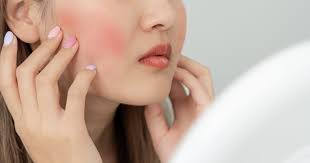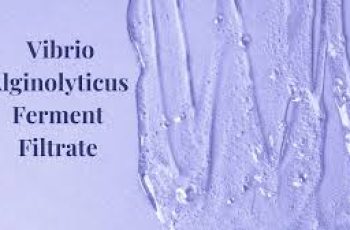
What Skincare Ingredients To Avoid If You Have Rosacea?
Having rosacea is certainly no walk in the park.
With various factors that contribute to a flare-up of red, uneven and bumpy texture, rosacea is a skin concern which has no impact on your health, but a great one on your self-confidence.
We have taken some time to look into some of the skincare ingredients that are best to avoid when suffering from rosacea, so let’s dive in.
What ingredients to avoid when suffering from rosacea?
There are a few ingredients to avoid when suffering from rosacea;
Alcohol, Fragrance, Menthol, Witch Hazel, Eucalyptus
These are some of the ingredients that can have an effect on your skin when you have rosacea.
It may seem confusing due to the fact some of them are considered natural or derived from natural sources, here is a closer look into why it’s best to avoid these ingredients.
Alcohol
Using skincare containing alcohol may have some benefits for those who have an oily or blemish-prone skin type, the same can’t be said for those who suffer from rosacea or have sensitive skin.
The effects of the alcohol include skin becoming tight, uncomfortable and very dry, with damage caused to the outer layers of the skin making it unable to naturally replenish itself.
With these effects, there are a huge number of problems that can accelerate making the skin appear dull, inflamed and showing various signs of ageing with fine lines and wrinkles.
Unfortunately for many of you alcohol isn’t just a concern in your skincare products, even consuming it, particularly wine will lead to rosacea flare-ups.
Fragrance
We are all guilty of giving skincare products a quick sniff, even if the label claims to be fragrance-free.
You wouldn’t be blamed for wanting to use products that have a pleasant odour and thankfully, many natural ingredients formulated into products have a great scent.
It is the synthetic fragrance added to mixtures to create an overall scent for the product or to hide any unpleasant-smelling ingredients used that can create a number of concerns for rosacea sufferers.
Finding out whether a formula has any fragrance can be a tricky task as there are a lot of different names and types used throughout the beauty industry.
The best approach would be to find a skincare product you would like to try and research it in more detail using various websites or forums of others who suffer from rosacea.
You can also seek help from a dermatologist or GP for further advice.
Menthol
You will regularly find menthol in products that have been formulated for blemish-prone and oily skin types as it’s clean, slight tingling sensation is favoured.
However, menthol is alcohol and as we have previously discussed, alcohol for sensitive skin types with rosacea is a no go and can trigger a flare-up and facial redness.
Witch Hazel
Yes, witch hazel is a natural ingredient and you’re probably wondering if it’s made its way onto this list by accident.
Though it is praised highly for its astringent and antioxidant properties during its distillation process it is mixed with alcohol, therefore, making it highly reactive for sensitive and rosacea-prone skin.
Though some short-term skin concerns can be effectively treated with the help of witch hazel, you may find that this could lead to a number of issues in the long-term.
Eucalyptus
Eucalyptus is packed with antibacterial properties and can help soothe and treat skin with great ease, there is an important factor to remember, and that is eucalyptus is a very potent,
fragranced oil and should be avoided by anyone who suffers from rosacea to prevent any redness.
There you have some common skincare ingredients that are best to be avoided when suffering from rosacea.
Though it may feel quite complicated to figure out whether your products have these reactive ingredients in them or not, we suggest keeping note of the products you use daily.
Perhaps make notes of the steps in your routine and if you find yourself having a reaction refer to your notes to help you come to a conclusion on which product could be causing the flare-up.
What ingredients are good for rosacea?
Whether your rosacea is mild or severe it is always a good idea to use skincare products that contain ingredients that will benefit your skin by keeping it soothed, calmed and free from redness.
Azelaic Acid
Though it is one of the lesser-known acids, azelaic is a remarkable ingredient and very effective at calming and soothing redness, be it from breakouts, such as spots, or rosacea.
Burning can be a result of using azelaic acid, but it is known to very rarely cause dryness and itching to the skin making it an ingredient that will benefit those with a sensitive skin type and prone to rosacea.
It is always best to ask for your GP about a product before using it if you are unsure or apprehensive. Check out our post about all about azelaic acid and what it does for the skin over on the blog.
Cosmeceuticals
These products are found over the counter and contain a few biologically active ingredients that have the ability to treat and manage your rosacea.
Green tea and niacinamide are two of the most common used to help relieve the discomfort caused by rosacea.
There is a post about the skincare benefits of niacinamide over on the blog should you wish to find out more.
What should I wash my face with if I have rosacea?
The key to washing your face if you have rosacea is to keep things gentle, from the pressure you use to the ingredients in your skincare products.
By maintaining a well-balanced and correct routine you will find:
Your skin remains comfortable for longer periods of time
You will find a boost to your skin’s overall health
You will find a reduction in rosacea flare-ups
Here are some simple steps to remember to keep your routine looking after your skin properly,
Cleanse your face twice a day
But remember to keep it gentle! Avoid products with the ingredients mentioned above and that also include foaming agents such as SLS.
Cleansing balms and milk used with warm water and your fingers are the best at keeping the skin fully cleansed and happy.
Moisturise everyday
By keeping on top of your moisturising not only are you preventing your skin from becoming dry, but you will also ensure your skin’s protective barrier remains fully functioning
and able to combat any free radicals or other skin-damaging molecules that come into combat with your face every day causing signs of ageing, breakouts and flare-ups.
Use an SPF every day
Rosacea flare-ups will not be helped by giving the SPF a miss, even if the day looks a little overcast, skin harming UV rays are able to penetrate through and come into contact with your skin.
To prevent any further damage it is best to apply an SPF of 30 and above every day.
Always test your products
You will get a better understanding of whether your skin will react from a product if you always ensure you perform a test before applying it all over the skin.
You can opt for a patch test, with a small amount applied to the inner arm and left for 24 hours when this time has passed and there are no signs of any reaction you can then use the product on your face.
So, there is some more information on which ingredients to avoid if you have rosacea and some advice on how to look after any flare-ups you could be currently suffering from.
As we have already mentioned before, if you have any concerns with your skin or introducing a new product into your routine finding a dermatologist to assist you will be for the best idea
and after they examine your skin, they will help identify your skin’s needs.


